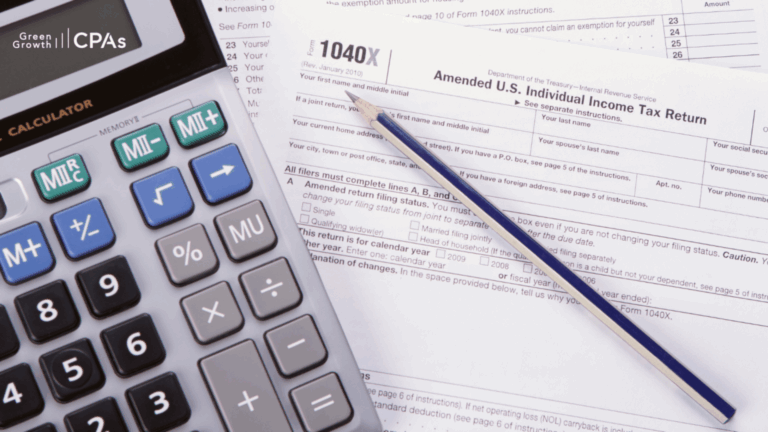Filing your tax return feels like crossing the finish line — but what if you later realize the numbers don’t tell the full story? Maybe a document arrived late, maybe you forgot to report an investment, or maybe you didn’t know you qualified for valuable credits.
The good news: the IRS allows you to correct past filings through an amended return (Form 1040-X).
At GreenGrowth CPAs, we see amended returns as an opportunity — not just to correct errors, but to make sure you’re taking full advantage of every benefit available to you. In this article, we’ll explore when filing an amended return is necessary — and why it might be the right move. Let’s dive in!
When does filing an amended return make sense?
- Missed income or investments: For example, you forgot to report interest from a savings account, a late-issued brokerage 1099, or rental income from a property.
- Incorrect deductions: You realized you could have deducted medical expenses, charitable contributions, or unreimbursed business expenses you left out.
- Education and family credits: Perhaps you didn’t claim the American Opportunity Tax Credit for tuition, or you missed the Child Tax Credit because of an oversight.
- Retirement contributions: You made an IRA or HSA contribution after filing, but within the deadline, and now want to claim it.
- Business or freelance income: You received an additional 1099-NEC for contract work that wasn’t included in the original filing.
- Change in filing status: You filed as Married Filing Separately but realize you’d save significantly by amending to Married Filing Jointly.
- Late or corrected K-1s: Partnerships, trusts, and S corporations often send updated forms after April 15 — and those can directly impact your taxable income.
In all these cases, an amended return ensures your taxes reflect your true financial situation — and often results in a lower balance due or a refund.
When Amending Is Not Necessary:
It’s just as important to know when you don’t need to file an amended return:
- Simple math mistakes: The IRS automatically corrects these.
- Missing attachments: If you forgot to include a schedule or W-2, the IRS will request it directly.
- IRS notices (like CP2000): These are usually handled through a direct response, not by amending the return.
The key is knowing when action is required and when it’s not. Acting unnecessarily can complicate your case — that’s why professional guidance is so valuable.
Deadlines and Special Rules
- Generally, you must file an amended return within: 3 years of filing the original return, OR
- 2 years of paying the tax, whichever is later.
Some situations have extended timeframes:
- Bad debts or worthless securities: up to 7 years.
- Net operating losses (NOLs): may extend refund opportunities.
- Federally declared disasters: special relief often extends deadlines for affected taxpayers.
If you filed your 2024 tax return on April 15, 2025, you usually have until April 15, 2028 to amend.
How GreenGrowth CPAs Can Help You
Amending a return is not just about filling out a form — it’s about making sure you don’t miss opportunities or risk penalties. Here’s how we help:
- Comprehensive Review: We look beyond the single issue and review the entire return to uncover other missed deductions or credits.
- Federal + State Compliance: If you amend your federal return, many states require you to file an amended state return as well. We coordinate both.
- IRS Representation: If your amendment is tied to an IRS notice, we prepare the response and represent your case.
- Strategic Planning: We don’t just “fix” the past — we adjust your tax strategy moving forward to avoid repeating the same mistakes.
- Deadline Tracking: We monitor amendment windows to ensure you never miss a refund opportunity.
Wrapping up:
An amended return can transform a simple oversight into a financial opportunity. Whether it means a refund, reduced taxes, or preventing issues with the IRS, it’s a powerful tool for keeping your financial picture accurate.
At GreenGrowth CPAs, we make the process seamless: from identifying whether you need an amendment, to preparing the paperwork, to communicating with the IRS on your behalf.
If you’re unsure whether your past returns are truly optimized, let’s review them together. The sooner you act, the more options you’ll have. Contact us today to discuss whether an amended return is the right move for you.




